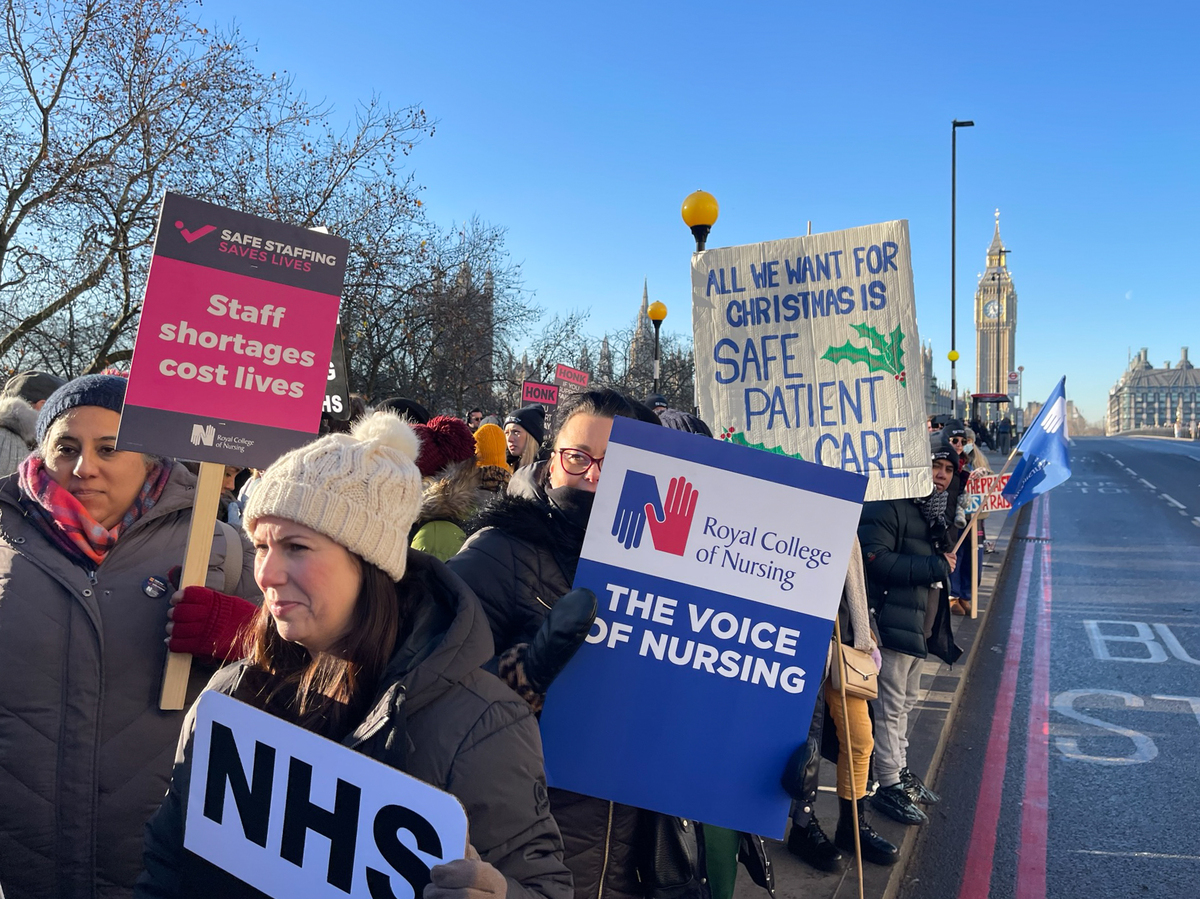British nurses picket outside St. Thomas’ Hospital in London on Thursday. The nurses’ union is asking for a 19% pay raise. Nurses, as well as postal workers, rail workers and some airport immigration officers, are staging walkouts over the holiday season. They are asking for pay increases as the U.K. faces nearly 11% inflation.
Frank Langfitt/NPR
hide caption
toggle caption
Frank Langfitt/NPR

British nurses picket outside St. Thomas’ Hospital in London on Thursday. The nurses’ union is asking for a 19% pay raise. Nurses, as well as postal workers, rail workers and some airport immigration officers, are staging walkouts over the holiday season. They are asking for pay increases as the U.K. faces nearly 11% inflation.
Frank Langfitt/NPR
LONDON — Across the River Thames from Big Ben last Thursday morning, a couple hundred nurses formed a picket line in front of St. Thomas’ Hospital. One waved a sign that read, “Can anyone find my friends? They all quit.”
“Currently nursing my inadequate pay,” read another.
As cars rode past, drivers honked their support.
“I think that nurses need to be given a pay rise that matches inflation because the cost of living [has] shot up so much,” said nurse Rosie Woods, referring to the United Kingdom’s inflation rate, which is near 11%, its highest level in four decades. “You’ve literally got nurses visiting food banks.”
Woods and tens of thousands of other nurses staged a one-day walkout Thursday, the biggest nursing strike in the history of Britain’s National Health Service.
And they’re not the only ones walking out. Joining them this month are employees from other essential services including rail workers, mail carriers and airport immigration officers. It’s the largest series of labor actions in the United Kingdom in more than a decade, and presents a major challenge to the new government of Prime Minister Rishi Sunak.

Royal Mail workers gather in Parliament Square as they hold a protest over pay in London on Dec. 9.
Alberto Pezzali/AP
hide caption
toggle caption
Alberto Pezzali/AP

Royal Mail workers gather in Parliament Square as they hold a protest over pay in London on Dec. 9.
Alberto Pezzali/AP
Various factors are driving the strikes, but the proximate cause is inflation resulting from Russia’s invasion of Ukraine and post-pandemic supply chain problems. But parts of the public service sector have been vulnerable for some time. The National Health Service, which provides free care, has been underfunded and hemorrhaging workers for years.
As a nurse, Woods focuses on identifying children who may be victims of domestic violence. She says because of low pay and high turnover among her fellow NHS workers, hundreds of children fall through the cracks.
“We regularly work over hours with case loads that are unsafe and too big to manage,” she says. “It’s just an accident waiting to happen.”

Rosie Woods, a nurse, pickets outside St. Thomas’ Hospital in London on Thursday. “You’ve literally got nurses visiting food banks,” she says.
Frank Langfitt/NPR
hide caption
toggle caption
Frank Langfitt/NPR

Rosie Woods, a nurse, pickets outside St. Thomas’ Hospital in London on Thursday. “You’ve literally got nurses visiting food banks,” she says.
Frank Langfitt/NPR
The nurses are demanding a 19% pay raise, but Woods thinks they’ll settle for less. Either way, the government says it simply can’t afford it. Officials say the British economy is already in recession. Heavy public spending during the pandemic helped blow a $67 billion hole in the country’s budget.
Defending his Conservative party’s record, Sunak says the government is now investing billions of dollars in the health service.
“We’re already hiring thousands more doctors and nurses,” he said in Britain’s House of Commons last week. “Last year, when everyone else in the public sector had a public sector pay freeze, the nurses received a 3% pay rise.”

Nurses from the Royal College of Nursing strike for fairer pay and working conditions on a picket line outside St. Thomas’ Hospital in London on Thursday.
Richard Baker/In Pictures/Getty Images
hide caption
toggle caption
Richard Baker/In Pictures/Getty Images

Nurses from the Royal College of Nursing strike for fairer pay and working conditions on a picket line outside St. Thomas’ Hospital in London on Thursday.
Richard Baker/In Pictures/Getty Images
Not surprisingly, some of those public service workers who had their wages frozen are among those also on strike.
On Friday and Saturday, more than 100,000 postal workers walked out. Their strike will resume on Dec. 23 and 24.
On strike days, rail workers have cut train operations across the country by 80%. By early Friday evening, the doors to London’s Waterloo station and its 24 train platforms were locked shut. More rail worker walkouts are scheduled beginning Christmas Eve.
Matthew Lee, a train guard, picketed last week in front of London’s King’s Cross station, which was nearly empty. He said one of his coworkers is now skipping dinner — because she can no longer afford it.
“All she wants to do is have the money to feed her kids,” Lee said.

Harlesden station during a transport disruption on the London underground, as members of the Rail, Maritime and Transport union went on strike in a dispute over jobs and pensions in London last Wednesday.
David Parry/PA Images/Getty Images
hide caption
toggle caption
David Parry/PA Images/Getty Images

Harlesden station during a transport disruption on the London underground, as members of the Rail, Maritime and Transport union went on strike in a dispute over jobs and pensions in London last Wednesday.
David Parry/PA Images/Getty Images
Susan Milner, a professor of European politics at the University of Bath who researches labor relations, says one reason so many public service workers are striking now is because of the global financial crisis that took place more than a decade ago. The British government made massive spending cuts and workers never regained their purchasing power.
“So, in general terms, we are poorer in our income than, say, pre-2008,” Milner says.
The government is also resisting labor demands for political and ideological reasons, she believes, and doesn’t want to be seen as giving in.
“In the Conservative leadership contest over the summer, certainly there was a lot of rhetoric about having a hard line on trade unions and strikes,” she says.
Some Britons welcome that hard line, especially because the strikes are coming during the holiday season.
Scott Arthur, who works in a hotel in Newcastle, is not sympathetic to the railway workers. He calls their strike “a load of rubbish.”
Lee thinks British unions could use a dose of the Iron Lady — the nickname given a former Conservative prime minister who is credited with crushing trade unions back in the 1980s.
“Margaret Thatcher sorted them all out,” says Arthur, “and it’s a shame she’s gone.”
NPR London producer Morgan Ayre contributed to this story.
Source link


